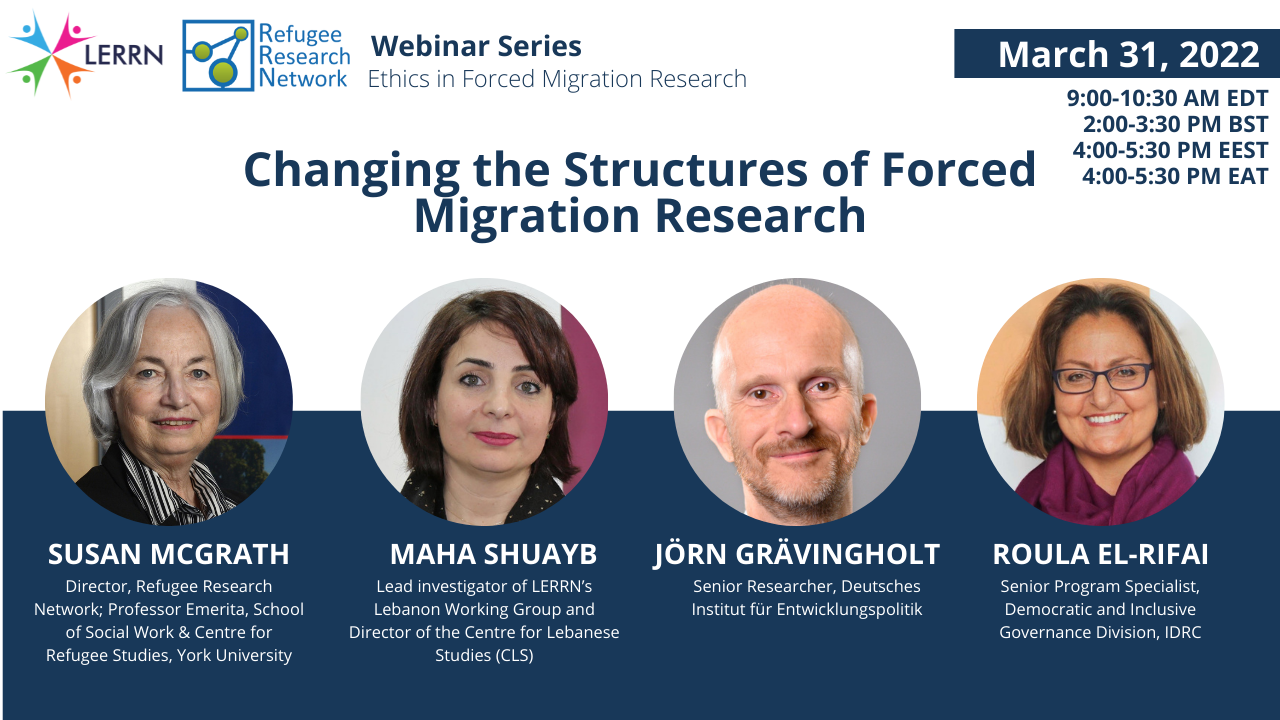The last webinar in a series on Ethics in Forced Migration Research, co-hosted by the Local Engagement Refugee Research Network (LERRN) and the Refugee Research Network (RRN), focused on funding structures for research on forced migration. Panelists spoke of the ways individual researchers can contribute towards addressing these issues and how the structures in place need to shift in order to create substantial change.
Maha Shuayb brought her expertise as Director of the Centre for Lebanese Studies and Lead Investigator of LERRN’s Lebanon Working Group and Susan McGrath brought her perspectives from the RRN. Coming from the perspective of donors, webinar participants also heard from Jörn Grävingholt of the German Development Institute and Roula El-Rifai, Senior Program Specialist at the Canadian International Development Research Centre (IDRC).
The panel began with a discussion on the additional challenges that many researchers in the global South face. Susan McGrath explained that access to such presumed basics as reliable electricity and the internet can be a barrier for researchers. She said some researchers do not have the same access to research assistants and in some regions, researchers must obtain permission before applying for research grants. Roula El-Rifai suggested that investing in sustainable institutions rather than individual researchers or individual projects can help address some of these capacity issues. According to her, institutions can play a crucial role in supporting ongoing research: “We have to use local institutions in a way to train the trainers. Local institutions become the hubs that can impact individual researchers as well as other institutions.” Funding research through opportunities like the IDRC’s research chairs on forced displacement is just one example of building up local institutional capacity to support sustainable localized research. Both Susan McGrath and Maha Shuayb pointed out the importance of supporting emerging scholars by creating resources like the Emerging Scholars and Practitioners on Migration Issues (ESPMI) Network. In McGrath’s view, emerging scholars lack the profile of more established scholars but can be supported with mentorship and other forms of support.
Coming from the global North perspective, Jörn Grävingholt explained that the whole industry of research needs to review its modes of operation. As one example of what needs to change, many scholars in the North will determine a topic for research in the South and then travel to conduct that research with a local partner, only to offer them a mere acknowledgement in a published article. The panelists agreed that scholars from the North should be including local researchers from the very beginning of the research design process. Grävingholt noted this way of doing research is beginning to change, but more needs to be done. He suggested that researchers from the North and the South have much to learn from each other.
Grävingholt reflected on how academic career incentive structures in the North reward individual authorship and published papers in academic journals, but do not reward research that helps local communities and do not incentivize making research accessible to the communities it affects. Instead, these career incentives hinder collaboration and uphold the hierarchical culture within academia. Maha Shuayb also critiqued how publishing research in an English language journal is not always helpful or accessible to refugee communities and host communities in the South who speak a different language. Roula El-Rifai highlighted the importance of redefining our understanding of knowledge, since knowledge continues to be Western-centric. Western scholars continue to be cited more frequently and their forms of knowledge privileged over diverse forms of knowledge produced in local contexts.
Finally, the panelists highlighted the importance of recognizing positive change. Over time, funding requirements have changed to support local leadership in research. As a scholar in the South ten years ago, Shuayb said she had to find a partner in the North to apply for funding, because she was not eligible to be a Principal Investigator (PI) on grant applications. Now she sees more opportunities for co-PIs in funding applications. Beyond forced migration studies, many fields are having similar conversations and there is much to learn from these other discussions. The COVID-19 pandemic brought opportunities for local research to take the spotlight amidst travel restrictions. Some scholars were able to collaborate with others in regions around the world thanks to adaptations with virtual technologies. Hybrid-style conferences and events can continue beyond travel restrictions to foster collaboration. For example, the International Association for the Study of Forced Migration (IASFM) is proposing a hybrid-model for its conference in 2024. While there is still a long way to go on many issues, we can celebrate and learn from these examples of positive change.
Click here to watch a full recording of this webinar.
This concludes the LERRN-RRN Webinar Series on Ethics in Forced Migration Research
Click here to read about or watch the recordings from the previous webinars in the series.
This report was prepared by: Kail Schlachter, LERRN Project Writer; Rawan Youssef, LERRN Strategic Communications Project Officer; Rachel McNally, LERRN Knowledge Mobilization and Translation Officer.
The LERRN-RRN Webinar Series on Ethics in Forced Migration Research is coordinated by Rachel McNally, LERRN Knowledge Mobilization and Translation Officer. For further information or ideas please contact us here.
